Crim 3388 - Study guides, Class notes & Summaries
Looking for the best study guides, study notes and summaries about Crim 3388? On this page you'll find 9 study documents about Crim 3388.
All 9 results
Sort by
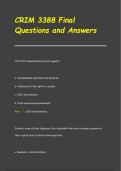
-
CRIM 3388 Final Questions and Answers
- Exam (elaborations) • 31 pages • 2024
- Available in package deal
-
- $12.49
- + learn more
The Fifth Amendment protects against: a. Unreasonable searches and seizures. b. Violations of the right to counsel. c. Self-incrimination. d. Cruel and unusual punishment. Ans- c. Self-incrimination. In which case did the Supreme Court establish the rule to advise a person of thier rights prior to police interrogations. a. Massiah v. United States b. Miranda v. Arizona c. William v. Unites States d. Frazier v. Cupp Ans- b. Miranda v. Arizona When a suspect makes an involuntary stat...
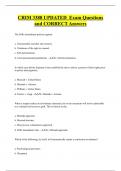
-
CRIM 3388 UPDATED Exam Questions and CORRECT Answers
- Exam (elaborations) • 15 pages • 2024
-
- $8.99
- + learn more
The Fifth Amendment protects against: a. Unreasonable searches and seizures. b. Violations of the right to counsel. c. Self-incrimination. d. Cruel and unusual punishment. - c. Self-incrimination. In which case did the Supreme Court establish the rule to advise a person of thier rights prior to police interrogations. a. Massiah v. United States b. Miranda v. Arizona c. William v. Unites States d. Frazier v. Cupp - b. Miranda v. Arizona
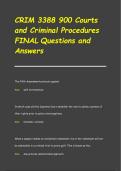
-
CRIM 3388 900 Courts and Criminal Procedures FINAL Questions and Answers
- Exam (elaborations) • 13 pages • 2024
- Available in package deal
-
- $10.69
- + learn more
The Fifth Amendment protects against Ans- self incrimination In which case did the Supreme Court establish the rule to advise a person of thier rights prior to police interrogations. Ans- miranda v arizona When a suspect makes an involuntary statement, his or her statement will not be admissible in a criminal trial to prove guilt. This is known as the: Ans- due process voluntariness approach Which of the following, by itself, will automatically render a confession involuntary? Ans- ...
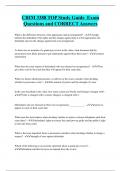
-
CRIM 3388 TOP Study Guide Exam Questions and CORRECT Answers
- Exam (elaborations) • 13 pages • 2024
-
- $8.99
- + learn more
What is the difference between a first appearance and an arraignment? - A judge informs the defendant of his rights and the charges against him at a first appearance; the defendant answers the charges against him at an arraignment. As there was no mention of a grand jury review in the video, what document did the prosecutors most likely present to get indictments against these three men? - criminal information What does the court require of defendants who are released on recognizance? ...
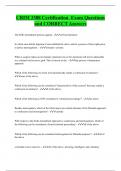
-
CRIM 3388 Certification Exam Questions and CORRECT Answers
- Exam (elaborations) • 6 pages • 2024
-
- $7.99
- + learn more
The Fifth Amendment protects against - self incrimination In which case did the Supreme Court establish the rule to advise a person of thier rights prior to police interrogations. - miranda v arizona When a suspect makes an involuntary statement, his or her statement will not be admissible in a criminal trial to prove guilt. This is known as the: - due process voluntariness approach Which of the following, by itself, will automatically render a confession involuntary? - none of the abo...
CRIM 3388 900 Courts and Criminal Procedures FINAL Questions and Answers
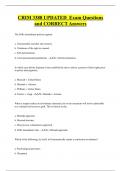
-
CRIM 3388 UPDATED Exam Questions and CORRECT Answers
- Exam (elaborations) • 15 pages • 2024
-
- $10.49
- + learn more
The Fifth Amendment protects against: a. Unreasonable searches and seizures. b. Violations of the right to counsel. c. Self-incrimination. d. Cruel and unusual punishment. - c. Self-incrimination. In which case did the Supreme Court establish the rule to advise a person of thier rights prior to police interrogations. a. Massiah v. United States b. Miranda v. Arizona c. William v. Unites States d. Frazier v. Cupp - b. Miranda v. Arizona
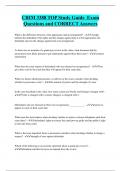
-
CRIM 3388 TOP Study Guide Exam Questions and CORRECT Answers
- Exam (elaborations) • 13 pages • 2024
-
- $10.49
- + learn more
What is the difference between a first appearance and an arraignment? - A judge informs the defendant of his rights and the charges against him at a first appearance; the defendant answers the charges against him at an arraignment. As there was no mention of a grand jury review in the video, what document did the prosecutors most likely present to get indictments against these three men? - criminal information What does the court require of defendants who are released on recognizance? ...
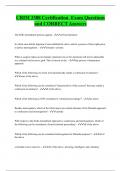
-
CRIM 3388 Certification Exam Questions and CORRECT Answers
- Exam (elaborations) • 6 pages • 2024
-
- $10.49
- + learn more
The Fifth Amendment protects against - self incrimination In which case did the Supreme Court establish the rule to advise a person of thier rights prior to police interrogations. - miranda v arizona When a suspect makes an involuntary statement, his or her statement will not be admissible in a criminal trial to prove guilt. This is known as the: - due process voluntariness approach Which of the following, by itself, will automatically render a confession involuntary? - none of the abo...

$6.50 for your textbook summary multiplied by 100 fellow students... Do the math: that's a lot of money! Don't be a thief of your own wallet and start uploading yours now. Discover all about earning on Stuvia


